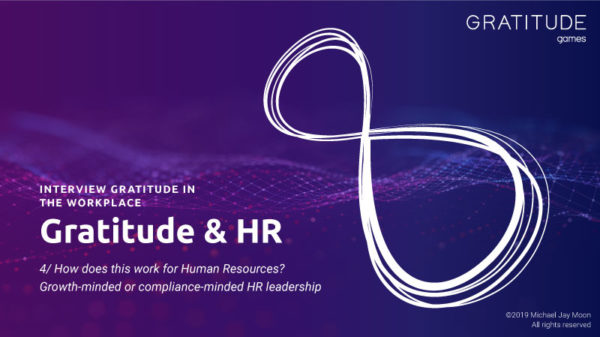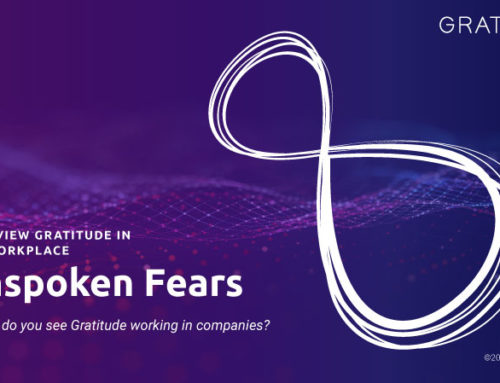HOW DOES GRATITUDE WORK FOR HR FOLKS?
You know I discussed that with a lot of people, startup CEOs, business advisors, HR executives, and other executives who have worked in midsize and larger firms.
Gratitude Games will strike some business professionals as something too adolescent, frivolous, or yet another wacky thing from San Francisco. And, of course, they’d be right to think that within a traditional, business-as-usual context.
But there’s more to it than tradition or that some people get it and others don’t.
To paraphrase a remark attributed to William Gibson, one of my favorite Sci-Fi cyberpunk novelists,
The future arrives unevenly distributed.
For me, this means that we find ourselves in one or three groups.
In the first group, some of us have already made the leap into the new normal: a world of persistent, unpredictable change, wicked complexity, and myriad choice.
For this first group, we become pioneers, pathfinders, way-makers and gamechangers.
That means challenging every assumption as it relates to how we make sense of our crazy world, how we relate and communicate, and how we coordinate the actions of individuals and groups.
In the second group, some of us see the future, see the need to make big changes, but in a few years, and not right now.
These folks can see massive storm clouds on the distant horizon. They don’t feel compelled to much of anything, until they feel the ground beginning to shift beneath them.
That underscores an established maxim about change,
“We make big changes only and until we perceive that our current situations has become more dangerous than making a needed change.”
The third group comprises executives and managers who just don’t see the need to change. They’re fixed and set in their ways.
Maybe they can see the need for change far in the future. But today, no dice. Maybe they believe that they will retire just in time, inherit family wealth, or whatever.
So, the idea of bringing gratitude in the workplace will resonate with those leaders and managers who have migrated to the new normal of our crazy world.
They will make it a priority to learn about character strengths, position agreements, the core protocols of high-performing teams, and other evidenced-based systems of performance management.
New HR Mandates
At a recent tech conference, I remember a panel discussion with the CEO and Chief HR Officer about culture building and the role of HR in high growth-potential startups and those have begun to scale.
This CEO said that they delayed staffing the HR position a long of possible, out of the belief that traditional HR professionals are “reactive, regressive and repressive” in their business outlook. While that struck me as extreme and bombastic, what followed was pure genius.
The CHRO said in a rather cheery tone,
“There are two types of HR professionals: Growth-minded or compliance-minded.”
She went to state that as a growth-minded HR leader, she had the mandate to grow the business by attracting the best talent available and removing barriers to their performance. Period.
She also echoed many of the people management principles of Google, about creating psychological safety, not tolerating toxic behaviors, and making data-driven decisions across the business, especially in making personnel decisions.
So, you can start with individualized objectives and key results, weekly check-in meetings, and strengths-based management and validate my central thesis: We can do a better job in making work more engaging, human, and a game worth playing.
Or you can make gratitude and its protocols a core focus on your Culture Plan and what one of my clients call their culture compass.
Here come the Millennials
I advise another startup in the connected wellness space.
They provide an Amazon Prime-like service to small and midsize businesses to research and buy various programs and services for employee wellness, productivity, and micro-learning. That includes fitness trackers, blood tests, etc.
However, their powerful commercial insight stems from the needs of this massive wave of Millennials that will have become the dominant demographic cohort in the workplace.
The CEO of this connected wellness startup had surveyed thousands of Millennials about their perceptions of workplace policies and ranked their preferences.
Wow. A huge portion of Millennials just do not accept, nor will they abide for long, lame-ass managers or policies.
As a cohort, they pretty much insist everyone be treated with dignity that transcends their role or status in the company hierarchy.
They want and will keep job-hopping until they find meaningful work that both challenges them to grow and recognizes the value that they bring to the company.
They value their personal relations as much or more than their professional relations.
They have accepted without complaint that the world will continue morphing in unpredictable ways and that as a tight-knit group or cognitive crew they will make their way, oh yeah, leveraging the heck out of all the new tech and the Internet.
Not only are all the CEOs that I coach are Millennials, I have had discussions with hundreds of Millennial friends and acquaintances about bringing Gratitude into their workplace
No one, not a single person, expressed any reservation or concern about bringing Gratitude into their workplaces. Just the opposite, I could summarize their sentiment with,
“Gratitude at work?
Yeah, I’m in. How soon can I start?”
And so I’ve spent months designing and testing programs for bringing Gratitude into workplace.
I also started to run small-group collaboratories for individuals who want to learn one new protocol per week, practice the heck out of it, and give me feedback and refinements.



